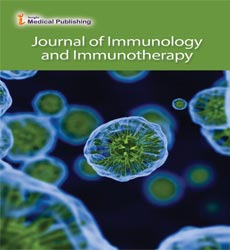Guardians of Innate Immunity in Disease Pathogenesis and Therapeutics Development
Oliver Caruso*
Editorial office, Journal of Immunology and Immunotherapy, United Kingdom
- *Corresponding Author:
- Oliver Caruso Editorial office, Journal of Immunology and Immunotherapy, United Kingdom. E-mail: jmso@emedicinejournals.org
Received Date: April 16, 2021; Accepted Date: April 19, 2021; Published Date: April 29, 2021
Citation: Caruso O (2021) Guardians of Innate Immunity in Disease Pathogenesis and Therapeutics Development. J Immuno Immnother. Vol.5 No.2:10.
Editorial Note
Host immunity protects against external invasions that have the potential to disturb the host's physiological homeostasis. Innate immunity serves as a first line of defense and aids in the establishment of adequate anti-infection defenses. Overactivation of innate immune components, on the other hand, leads to immunopathogenesis. The complement protein family constitutes the complement system and contributes in the development of inflammation and the elimination of target harmful microbial cells via specific immune mechanisms. Anti- microbial proteins, often known as peptides, are another kind of protein involved in innate immune response. These proteins or peptides either act directly on target cells or aid in elimination by recruiting suitable immune cells. Innate immunity cellular components such as macrophages, dendritic cells, and natural killer cells are the first responders to any foreign intruders and initiate a series of primary responses such as phagocytosis, or direct killing of modified self (tumor or cancerous) cells, or inducing inflammation via various inflammatory mediators via complex cellular signaling pathways. Innate lymphoid cells of the lymphoid lineage are specialized immune cells that play a crucial role in immunological control on mucosal surfaces to maintain immune homeostasis.
Hepatocytes produce a series of thermolabile complement proteins that play an important role in host defense. In the presence of a microbial pathogen, the complement system activates through three different pathways: classical, alternative, and lectin. The classical system is activated by the development of an antigen-antibody complex, whereas the alternative and lectin pathways are activated by sugar-binding lectin protein, respectively. These pathways have the functional consequence of inducing inflammation, cytolysis, and facilitating phagocytosis of target cells. In a review, several experts examined the biochemistry of complement family proteins and their function in pathogen clearance. The article focuses on dysregulated complement system components, either deficiency or overactivation, and their influence on physiology or the development of immunopathology, such as severe systemic infection or autoimmune disorders.
Lung cancer is the leading cause of mortality worldwide, accounting for one-third of all cancer deaths. Nonsmokers may get lung cancer as a result of cigarette/tobacco smoking and passive intake of smoke. Furthermore, chronic and persistent inflammation in lung tissues can promote oncogenesis via different signaling pathways. Lung cancer is categorized into two types: Non-Small Cell Lung Cancer (NSCLC) and Small Cell Lung Cancer (SCLC); in which NSCLC is more deadly. The host immune system plays an important role in regulating altered cells by recruiting immune cells such as natural killer cells and T cell subsets. Macrophages are phagocytic cells and one of the main actors in immunity, connecting innate and adaptive immunity through the release of soluble cytokines and the expression of MHC molecules required for T cell activation. M1 and M2 macrophages are functionally distinct from M1 macrophages. M1 macrophages induce inflammation, whereas M2 macrophages suppress it. Exosomes produced from M2 macrophages and their functions in disease pathogenesis have been documented by certain investigators. The ability to manipulate illness is by targeting exosomes.
Natural Killer (NK) cells play a critical role in innate immunity against viral infection and tumor cells. The NK cell identifies tumor cells and kills them by injecting toxic granules containing perforin and granzyme into the target tumor cells. Tumor cells, in turn, offer a milieu for NK cells to alter their characteristics. Instead of destroying tumor cells, the transformed NK cells start spreading malignant cells or encourage metastasis.
Innate Lymphoid Cells (ILCs) are newly identified lymphoid linage innate immune cells found on the host's mucosal surfaces/ tissues. There are four kinds based on cytokine production and immunological function. ILCs have a crucial role in immune homeostasis, tissue healing, and infection control at mucosal surfaces and deep inside tissues. ILCs have a role in a variety of hypersensitivity events, including allergy reactions, asthma, and the development of autoimmune disorders.
Open Access Journals
- Aquaculture & Veterinary Science
- Chemistry & Chemical Sciences
- Clinical Sciences
- Engineering
- General Science
- Genetics & Molecular Biology
- Health Care & Nursing
- Immunology & Microbiology
- Materials Science
- Mathematics & Physics
- Medical Sciences
- Neurology & Psychiatry
- Oncology & Cancer Science
- Pharmaceutical Sciences
